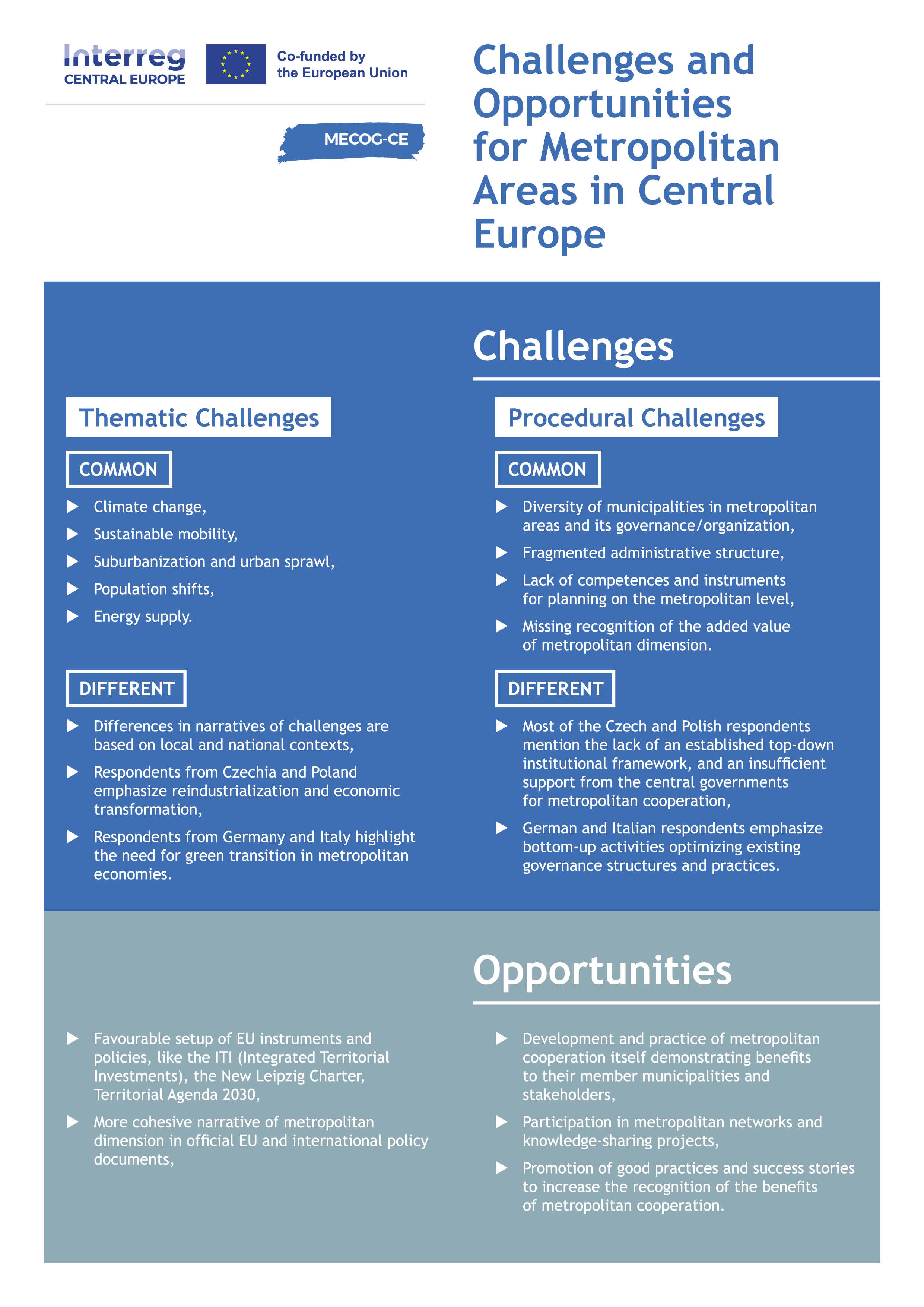Fragmented Recognition in EU and International Documents
The concept of “metropolitan” development, governance or cooperation is infrequently used in EU and international strategic and policy documents, resulting in fragmented recognition. While there has been increasing emphasis on the metropolitan dimension in discussions about urban and regional policies, it has not yet resulted in significant changes in policy implementation. While there is acknowledgment of the importance of metropolitan areas, it lacks a systematic and consistent approach. There is a need for a more explicit and cohesive narrative of metropolitan dimension in European strategic and policy documents.
Common Thematic Challenges and Regional Variations
Central European metropolitan areas face common thematic challenges, including climate change, energy supply, sustainable mobility, population shifts, suburbanization, and urban sprawl. However, regional interpretations of these challenges differ. Respondents from Czechia and Poland often cite burdens related to reindustrialization and economic transformation, whereas those from Germany and Italy tie economic transformations to the need for green transitions.
Procedural Challenges in Metropolitan Cooperation and Governance
Procedural challenges are consistent across all MAs, including diverse municipalities in metropolitan territories, administrative fragmentation, lack of formal planning instruments, complex thematic priorities, and insufficient competences to address metropolitan challenges. However, these challenges take on distinct forms in individual MAs. Czech and Polish respondents, except for Górnośląsko-Zagłębiowska Metropolia (GZM), often highlight the lack of an established top-down institutional framework or insufficient support from central governments for metropolitan cooperation. German and Italian respondents place a stronger emphasis on bottom-up activities optimizing existing governance structures and practices.
Opportunities for Promoting Metropolitan Dimension
Opportunities for promoting the metropolitan dimension are closely linked to favorable EU instruments and policies, such as ITI (Integrated Territorial Investments), the New Leipzig Charter, and the Territorial Agenda 2030. The key opportunity lies in the development and practice of metropolitan cooperation itself, which can demonstrate the benefits of synergies between member municipalities and other metropolitan stakeholders. Areas such as spatial planning, mobility, environmental issues, and shared services like waste management are considered ideal for showcasing successful practices. Additionally, participation in metropolitan networks and knowledge-sharing projects plays a pivotal role in promoting the metropolitan dimension and strengthening MAs’ influence in public policies.
The Next Step: Common Metropolitan Vision
The investigation of challenges and opportunities within the MECOG-CE project serves as a knowledge exchange process, fostering a mutual understanding of metropolitan challenges and opportunities. The information gathered here will guide the formulation of a Common Metropolitan Vision. This vision will be a policy advocacy document that represents the stance of MECOG-CE partners in promoting the metropolitan dimension in public policies.
Summary
In summary, our analysis illuminates the fragmented recognition of the metropolitan dimension within EU and international documents, emphasizing the pressing need for a more cohesive approach. Central European Metropolitan Areas (MAs) contend with shared thematic challenges, including climate change, energy supply, sustainable mobility, population dynamics, suburbanization, and urban sprawl, though these challenges manifest with regional variations. Procedural challenges such as administrative fragmentation and the absence of formal planning tools, persist across MAs but assume distinctive forms based on their level of experience with metropolitan cooperation. Opportunities to fortify the metropolitan dimension hinge on favorable EU instruments, the cultivation of metropolitan cooperation, engagement in networks and knowledge-sharing initiatives, and the promotion of best practices. This exchange of knowledge will guide the formulation of a Common Metropolitan Vision, a pivotal policy advocacy document. Through fostering mutual understanding and cooperation, we aspire to drive Central European MAs toward becoming thriving hubs of metropolitan development.

